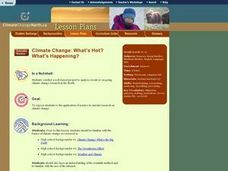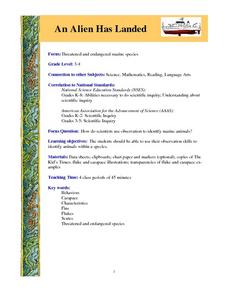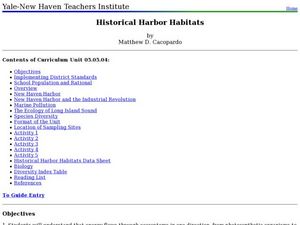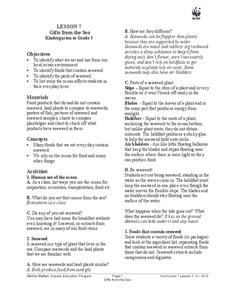Curated OER
Researching the World's Oceans
Students research and compare important features of the oceans based on current data. They examine the globe or map, determine the major oceans of the world, and record their names on the data sheet.
Curated OER
History and Oceanography
Young scholars identify the accomplishments in oceanography from 17th-19th century, construct a time line with the scientists in chronological order, and discuss the parallels of oceanographic contributions with those in other areas of...
Curated OER
Climate Change: What's Hot? What's Happening?
Students conduct a web-based project to analyze recent or on-going climate change research in the North. They are exposed to the application of science in current research on climate change.
Curated OER
Amphipods
High schoolers identify organisms that live at the bottom of the body of water. For this biology lesson, students evaluate the effects of pollution to amphipods population. They examine collected data and create a bar graph comparing them.
NOAA
Through Robot Eyes
How do robots assist ocean explorers in collecting data and images? The final installment in a five-part series has science scholars examine underwater images collected by robots and identify the organisms shown. Groups then calculate...
University of Waikato
Estuary Metaphors
Mixing metaphors into science. To begin, the instructor leads a discussion about estuaries to determine what the class already knows. Working in small groups, pupils determine how a selected object is similar to an estuary, how it...
American Museum of Natural History
Make Your Own Creatures of Light
Bioluminescent animals are the focus of a hands-on craft in which scholars create a scene of either a land or sea bioluminescent creature.
NOAA
Journey to the Unknown
Go where no one has gone before. Learners experience what it is like to be a scientist exploring new territory. Using audio and a scripted text, pupils take a trip in the depths of the ocean. They follow their trip with a hands-on...
National Wildlife Federation
Plastic in the Sea
How much plastic do people use? Class members identify how plastic is involved in their daily lives by looking at food packaging either at a grocery store or at home. Learners view statistics for the amount of plastics found on a beach...
Nature Works Everywhere
Fishing for a Future
Teaching a man to fish has an environmental impact. Through a series of four lessons, learners study the science of fishery management. Their study involves analyzing data to develop a management strategy for specific fish and common...
DiscoverE
Action Figure Diver
Will your next buoyancy lab rise to the occasion? Make a splash with action figure divers! Teams of young physicists explore the relationship between mass and buoyancy by adding weights or balloons to achieve a diver that neither sinks...
College Board
2006 AP® Environmental Science Free-Response Questions
There is a strong correlation between the carbon dioxide concentration in the air temperature. Scholars offer explanations for the correlation in one of four AP® free-response assessment questions. Their analyses in the other questions...
ReadWriteThink
Webcams in the Classroom: Animal Inquiry and Observation
Boost observational skills with an inquiry-based lesson that takes scholars on a virtual field trip. With help from webcams, learners observe animals in a zoo or aquarium. Observations go into a journal and a discussion is held to review...
Aquarium of the Pacific
Kelp Forest Conservation
There otter be a better way. As a class, groups work together to create a food web based on the organisms in the kelp forest. Budding scientists watch a video on the kelp forest to see how the organisms create a food web and hear about...
American Museum of Natural History
Mammal Flipbooks
Scholars follow eight steps to create a flipbook and discover key facts about mammals' locomotion.
Bonneville
Design and Engineer Solutions
What's the best way to collect all that trash? A culminating activity has scholars use the knowledge and skills from the unit to design a solution to the plastic trash island problem. They use 3-D pens or a 3-D printer to build models of...
Curated OER
An Alien Has Landed
Students identify animals within a species by using their observation skills to record information, such as behavioral characteristics.
Curated OER
Ship of the Line
Students discover boats by researching 18th century ships. In this Naval history instructional activity, students identify and describe the different components of an 18th century naval ship after researching information on the...
Curated OER
Historical Harbor Habitats
Tenth graders create food web displays in the classroom. In this ecology lesson, 10th graders identify the different pollutants in the environment and their effect on organisms. They collect samples of sediments from the harbor and...
Curated OER
Monitoring Coral Reefs
Students investigate data on coral reef monitoring in a marine protected area in the Florida keys. In this coral reef lesson plan, students use online data from a marine protected coral reef to complete a worksheet about coral...
Curated OER
Blue Planet: Tidal Seas
Students investigate how tides affect sea life. In this video based lesson, students view a video on how tides affect sea life. They do web-based research to find the answers to a series of questions and then play Tidal Trivia to test...
Curated OER
Ocean Poster
Students discover ocean life by creating a mural. In this ocean biology lesson, students utilize a computer to find images of the ocean that can be used to create a collage. Students discuss the different images and how the...
Curated OER
Gifts from the Sea
Students discover the oceanic food chain. In this healthy eating lesson, student investigate the fish we eat and the food the fish eat. Students discover what ocean animals eat seaweed and what everyday foods we eat that also...
Curated OER
Schooling Fish
Learners make fish models. For this fish behavior lesson, students create lanternfish fishsticks, learn how a school of fish live, eat and swim together, examine the predator-prey relationship, and read the book Swimmy to...
Other popular searches
- Marine Ocean Zones
- Ocean Fish Life Cycle
- Ocean and Sea Creatures
- Life in the Ocean
- Life on the Ocean
- Origin of Life Ocean

























